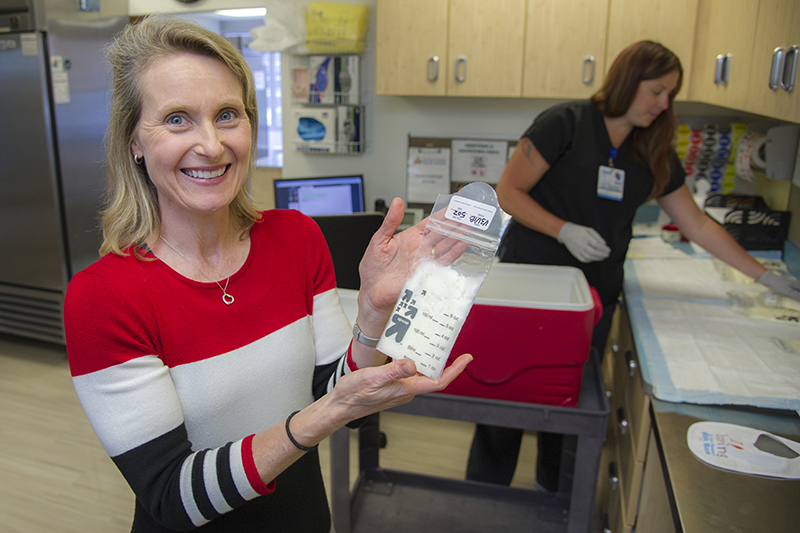Milk bank directed by EVMS faculty member overflows with donations

In June 2014, the first milk bank in Virginia began accepting donations of breast milk from carefully screened donors. The hope was to eventually collect enough milk to supply all the babies being cared for in the Neonatal Intensive Care Unit at Children’s Hospital of The King’s Daughters who weren’t receiving their own mother’s milk.
Within six months of opening, not only was that hope realized, says Milk Bank Manager Ashlynn Baker, BSN, RN, “We had more milk than we knew what to do with.”
Today, The King’s Daughters Milk Bank not only supplies the NICU and infants in need at CHKD, it also ships donated milk to 37 other hospitals from Connecticut to Florida. Donations have grown so quickly that the milk bank has had to add seven freezers to the three it started with.
And in March, it surpassed one million ounces of donated milk from nearly 1,200 donors, who receive no compensation for their milk.
“Because we’ve had so much milk donated,” Ms. Baker says, “we’ve even been able to help other milk banks when their supply of donor milk was low.” She attributes the soaring donations, in part, to the high rate of young mothers in Hampton Roads’ large military community.
Michelle Brenner, MD (Pediatrics Residency ’98), Associate Professor of Clinical Pediatrics at EVMS and a pediatrician with CHKD’s General Academics Pediatrics, is Medical Director of the milk bank. “Ours was the 18th milk bank in North America but one of the first established by a children’s hospital,” says Dr. Brenner (pictured above). “That connection gave us great credibility.”
The Norfolk-based milk bank’s credibility is also high because it follows the strict protocols of the Human Milk Banking Association of North America. Protocols include triple screening of applicants, pooling the milk of three to five donors in every batch, pasteurizing all milk, and testing it for bacteria after pasteurization. To date, no HMBANA milk bank has had an adverse outcome.
In 2012, the American Academy of Pediatrics issued a statement saying that because human milk is so beneficial to babies, “if a mother’s own milk is unavailable, pasteurized donor human milk should be used.”
For mothers who have lost their babies but are still producing breast milk, there’s a different benefit. “Donating their milk can help them with the grieving process,” Ms. Baker says. After the final legacy donation from bereaved donors, the milk bank presents them with a necklace that has a pendant containing a few drops of their breast milk.
Overseeing The King’s Daughters Milk Bank was a logical step for Dr. Brenner, who in 2017 was named a Health Care Hero by Inside Business and a Top Doc by Coastal Virginia Magazine. A board-certified lactation consultant, she is a specialist in the field of breastfeeding medicine and fellowship-trained in integrative medicine.
The milk bank was made possible by funding from the same group of women who established CHKD in 1961, The King’s Daughters. Ongoing support from CHKD, community physicians and the generous milk donors have contributed to the milk bank’s success.
“Each ounce of donor milk can provide several infants with potentially lifesaving medical treatments,” Dr. Brenner says, “offering nutrition as well as anti-inflammatory components and growth factors to decrease common complications of prematurity. Every day, our team is able to realize the direct impact we have on the lives of our milk donors and recipients. It’s a great day’s work.”
To learn more or become a milk donor, call 757.668.MILK (6455) or email KDmilkbank@chkd.org.